Statement by H.E. Ambassador MIKANAGI Tomohiro, Deputy Permanent Representative of Japan to the United Nations, at the General Debate of the 80th Session of the Second Committee
2025/10/10

Mr. Chair,
Let me begin by extending my heartfelt congratulations to His Excellency Ambassador Dibba of The Gambia and the other newly appointed Bureau members. I would also like to express our deepest gratitude to His Excellency Ambassador Muhith of Bangladesh and the previous Bureau members for their invaluable contributions over the past year.
Japan reaffirms its commitment to engage openly and constructively in all significant discussions within the Committee. We have high expectations for the Committee to achieve fruitful outcomes under your strong leadership, supported by constructive debates among the Member States. In this context, we kindly request the Bureau to establish and share in advance a comprehensive schedule for resolution negotiations to facilitate smooth proceedings.
Mr. Chair,
Amid ongoing discussions under the UN80 Initiative, there is a growing demand for greater rationalization to ensure sound financial and budgetary management. Japan wishes to reiterate its position that funds should be allocated to activities that are genuinely necessary.
To achieve “more with less” rather than “less with less”, cross-cutting approaches that effectively link the various UN activities towards sustainable development is necessary. In this regard, the concept of "human security," which focuses on individuals and contributes to securing human dignity, is proving increasingly useful in guiding UN activities.
From this human security perspective, Japan believes that health and education continue to be the key areas, but fields such as the environment and climate change, disaster risk reduction, and science, technology and innovation, including AI, are increasingly becoming key areas.
Mr. Chair,
Allow me to share our thoughts on these four key areas in achieving sustainable development.
First, in the face of declining aid, Universal Health Coverage (UHC) requires the establishment of sustainable health financing and increased mobilization of domestic resources. To this end, Japan is eager to contribute with technical support to strengthening institutional and policy capacities. Alongside technology transfers on voluntary and mutually agreed terms, fostering environments that encourage continuous innovation to address challenges is crucial for strengthening health systems, including pandemic prevention, preparedness, and response, with a view to the high-level meeting on Pandemic preparedness planned for 2026.
Second, climate-related disasters, such as unprecedented heatwaves, floods, wildfires, sea-level rise, and the degradation of ecosystem services, are increasingly impacting essential elements for human survival, including food, water, and housing. Faced with these challenges, effective action must be taken by all countries, including those under relevant treaties such as the UNFCCC and the Paris Agreement, as well as the Convention on Biological Diversity.
Third, this year marks the 10th anniversary of the Sendai Framework for Disaster Risk Reduction. Over the past decade, the damage from disasters such as earthquakes and floods has become more severe, posing significant challenges to human lives, particularly for vulnerable countries like SIDS and LDCs. Disaster risk reduction based on the “human security” approach is increasingly becoming essential, and international cooperation through knowledge sharing must be strengthened.
Lastly, we should keep in mind the essential role of private sector participation and innovation in achieving the SDGs. Promoting innovation through the development and utilization of AI while mitigating its risks is a critical task facing the international community in achieving sustainable development in the age of AI. Therefore, human-centered and multi-stakeholder approaches are vital in the area of science, technology, and innovation, including AI. Japan aims to contribute to efforts in eliminating digital divides both within and between countries and in solving diverse societal challenges by building governance frameworks and ecosystems for safe, secure, and trustworthy AI, as well as fostering human resources.
Mr. Chair,
Last year, world leaders adopted the "Pact for the Future”. It is now crucial to translate the Pact into concrete actions. Taking into account the outcomes of recent conferences such as FfD4, the 9th Tokyo International Conference on African Development (TICAD9) also contributed to the discussion on key issues. Also in view of the World Social Summit in November, Japan is committed to actively contributing to discussions aimed at achieving our shared goal of "leaving no one behind."
I thank you.
